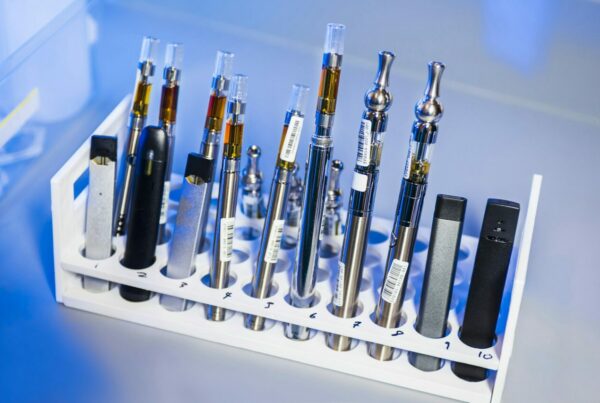N, N-Dimethyltryptamine (DMT) is a compound commonly found in various plants and animals, known for its intense, albeit brief, psychedelic effects upon ingestion.
There is mounting evidence to suggest that naturally occurring DMT in the human body plays significant roles in both the peripheral and central nervous systems, possibly functioning as a neurotransmitter.
DMT can induce powerful psychedelic experiences, but typically, it does not result in many negative effects, except possible cardiovascular problems when taken in high doses via injection.
Let’s explore DMT and its varied functions, ranging from recreational use to its promising potential in scientific research and therapeutic applications.

A Brief Introduction to DMT: What is it?
| Aspect | Details |
| Name | N, N-Dimethyltryptamine (DMT) |
| Classification | Indole alkaloid |
| Occurrence | Occurs naturally in a variety of plants and animals |
| Psychoactive Effects | Produces brief yet intense psychedelic experiences upon consumption. |
| Method of Consumption | Can be smoked, injected, or ingested orally. |
| Duration of Effects | Effects last for a short period, typically between 5 to 30 minutes. |
| Chemical Structure | Comprises a tryptamine core with two methyl groups attached to the amine nitrogen atom. |
| Metabolism | Rapidly metabolized by the body, broken down by monoamine oxidase (MAO). |
| Cultural Use | Historically used in various ceremonial and shamanic rituals by indigenous cultures. |
| Other names | Dimitrifantasia, Businessman’s trip, Businessman’s special, 45-minute psychosis, Spiritual molecule |
The Role of DMT in Mental Health
N, N-Dimethyltryptamine (DMT), a compound known for its potent psychedelic effects, is garnering attention for its potential benefits to mental health. Despite its conventional association with intense visionary experiences, recent research suggests a correlation between DMT and mental wellness.
Influence on Psychological and Emotional Well-being
DMT is known for its psychedelic effects that are capable of inducing profound emotional reactions and altering states of consciousness. These effects have potential therapeutic applications for addressing mental health issues, aiding in emotional processing, and providing new perspectives on personal traumas.
Neuroplasticity and Brain Function
Research suggests that DMT could influence neuroplasticity, thereby enhancing the brain’s ability to adapt and reorganize. Investigating its impact on synaptic plasticity and neural connectivity may yield potential treatments for conditions associated with neural maladaptation.
Potential Therapeutic Use for Mental Health Disorders
Early studies underline the potential of DMT in treating disorders like depression, addiction, and PTSD. Its ability to induce mystical or spiritual experiences may offer a distinctive psychotherapeutic strategy for reshaping detrimental thought patterns.
Investigations into the natural production of DMT within the body have shown its significance in mental health resilience, stress response, and overall psychological well-being. Understanding how the body regulates internal levels of DMT could potentially lead to novel therapeutic interventions.
DMT and Mental Health Disorders
| Mental Health Disorder | Description | DMT’s Potential Effectiveness | Benefits |
| Depression | Identified by a mood disorder characterized by persistent sadness, lack of interest, and decreased motivation | Initial research suggests DMT may help mitigate symptoms by inducing deeply emotional experiences. | Its rapid onset and ability to stimulate transformative experiences could provide novel and unique therapeutic avenues for reshaping negative thought patterns and enhancing emotional processing |
| Post-Traumatic Stress Disorder (PTSD) | A mental health disorder triggered by traumatic events, resulting in flashbacks, severe anxiety, and intrusive thoughts | Preliminary research points towards DMT’s potential to manage symptoms by inciting spiritual or mystical experiences, which could help patients reframe traumatic memories | DMT’s potential to induce altered states of consciousness could assist in facilitating emotional processing and offering a new perspective on traumatic experiences |
| Addiction | A complex disorder characterized by compulsive engagement in rewarding stimuli despite adverse consequences | Some research suggests DMT’s effectiveness in disrupting addictive behaviours and lessening substance cravings | DMT’s potential to stimulate intense and transformative experiences could help individuals alter their behavioural patterns and confront their addictions |
| the underlying reasons for their addiction |
Approach to Using DMT
DMT, celebrated for its capacity to induce short but powerful psychedelic experiences, can be consumed in multiple ways. The choice of administration often hinges on the desired intensity and duration of the trip.
Smoking:
DMT, when inhaled through a pipe or vaporizer, necessitates precise temperature control to avoid overheating and combustion of the compound. When smoked, the psychedelic effects of DMT commence almost instantly, typically lasting between 5 to 15 minutes.
Oral Intake:
Taking DMT orally leads to slower but longer-lasting effects, often extending for several hours. This is due to the decelerated metabolization of DMT when combined with an MAOI.
Injection:
DMT can be administered directly into the bloodstream for rapid and powerful effects.
This approach results in an immediate and potent experience, but it demands precise dosing and poses increased risks.
Insufflation (Snorting):
Inhaling DMT nasally results in a slower onset of effects compared to smoking but may provide a more extended experience.
Sublingual or Buccal Administration:
When absorbed through the tissue in the mouth, this method serves as an alternative to smoking and offers a longer, though less intense, experience.
Determining Therapeutic Dosage: N, N-Dimethyltryptamine (DMT)
For inhalation, the recommended dosage is between 20 to 40 mg, while for intravenous administration, the suggested dosage is 0.2 to 0.4 mg per kg of body weight. These dosage guidelines are primarily meant for clinical research and are particularly important for intravenous administration.
- Higher doses given intravenously are associated with powerful visuals, temporary loss of control, and a compound state of anxiety and euphoria
- Interestingly, lower doses have demonstrated less desirable effects
- Recreational doses of inhaled DMT usually range from 40 to 50 mg, occasionally even reaching up to 100 mg
- Different doses of intravenous People who have had near-death experiences associated with DMT (7, 14, 18, and 20 mg solutions) have reported lasting positive enhancements in their psychological well-being.
Availability of DMT
Osmosis – 4-ACO-DMT Ethereal Essence Tincture
This tincture is claimed to contain 4-Acetoxy-N, N-dimethyltryptamine (4-AcO-DMT), a DMT variant. Tinctures are liquid extracts designed for oral use, and this specific product may offer a distinct experience compared to conventional DMT.
Lucid Supply Co. – 5-MeO DMT Vaporizer
This product is a vaporizer that delivers 5-Methoxy-N, N-dimethyltryptamine (5-MeO-DMT). 5-MeO-DMT, the active ingredient, is known for its intense, transformative, and often short-lived experiences.
Integral Alchemist – Acacia – 1ml DMT Vape Cartridge
The Integral Alchemist’s DMT vape cartridge is pre-filled with N, N-Dimethyltryptamine. This product is likely intended for individuals who prefer a discreet and convenient method of DMT consumption.
Deadhead Chemist – 5-Meo-DMT Cartridge
This cartridge contains 5-Methoxy-N, N-dimethyltryptamine (5-MeO-DMT), a compound known for its deep and intense effects.
Potential mental health benefits may include personal growth, spiritual experiences, or therapeutic applications designed to enhance emotional well-being.
Deadhead Chemist – N, N DMT Cartridge
Another offering from Deadhead Chemist, this cartridge is filled with the traditional N, N-Dimethyltryptamine. Cartridges provide a user-friendly method for DMT consumption, allowing for a more consistent and controlled experience.
Closing Remarks
The use of N, N-Dimethyltryptamine (DMT) in
How to use DMT safely and effectively for mental health?
Mental health therapy introduces a thrilling but complex journey. The ability of the compound to induce intense, albeit brief, psychedelic experiences opens the door for innovative therapeutic methods.
Initial studies point to its possible role in emotional processing, personal development, and potentially
The substantial influence of mental health treatment requires careful evaluation and responsible usage.
For individuals keen on responsibly exploring DMT products, reliable sources like Magic Mushrooms Edmonton Canada Online Dispensary are available to offer advice and a variety of choices.
Frequently Asked Questions:
How do different DMT products affect mental health?
For instance, vaporizers may result in immediate effects, while tinctures or vape cartridges can provide more controlled and consistent dosages.
Including derivative compounds or 5-MeO-DMT can result in various levels of intensity and different types of mental health impacts.
These slight differences underscore the need to select a DMT product based on individual preferences and mental health goals.
Can DMT induce long-term changes in mental health and personal growth?
There are anecdotal reports that suggest that DMT-induced experiences could bring about enduring changes in mental health and personal development.
Profound or life-altering experiences, such as near-death-like experiences, are often associated with ongoing positive changes in psychological health and personal evolution.
While these experiences are intense and temporary, they often provoke self-examination, spiritual revelations, and a sense of unity or enlightenment.
Individuals often report a refreshed perspective on life, improved emotional resilience, and an enhanced appreciation for life following these experiences.
What is the most effective strategy for using DMT for mental health?
It is essential to make informed decisions, which involves thorough research and understanding of the compound’s effects.
Advice from mental health professionals or experienced users can provide valuable information about potential risks and advantages.
Recognizing personal tolerance levels and mental preparedness is also paramount, as is ensuring a supportive and secure environment for the experience.
How does DMT fare when compared to other psychedelic therapies such as psilocybin or LSD in the realm of mental health treatment?
DMT, compared to other psychedelics like psilocybin or LSD, has different effects, durations, and intensities. It is known for its brief duration.
The unique encounters brought about by these high-intensity, short-acting psychedelics necessitate distinct therapeutic strategies in the field of mental health, differing from those applied to psychedelics with longer durations.
Recommended Additional Reading:





